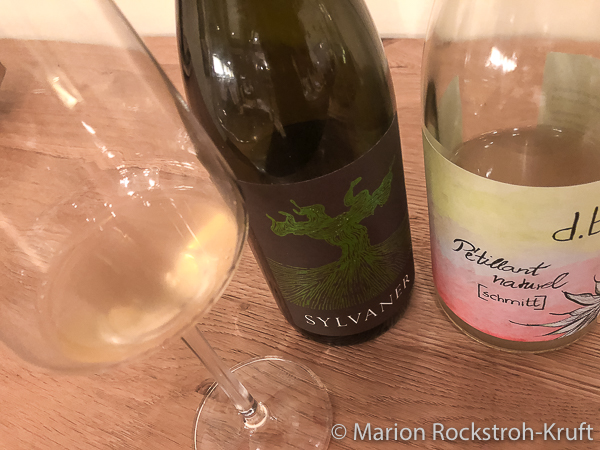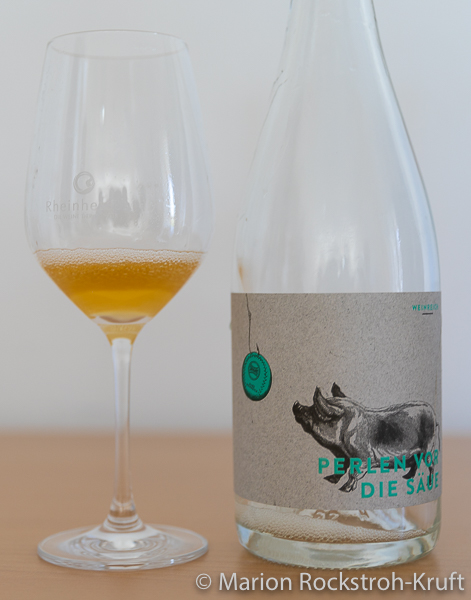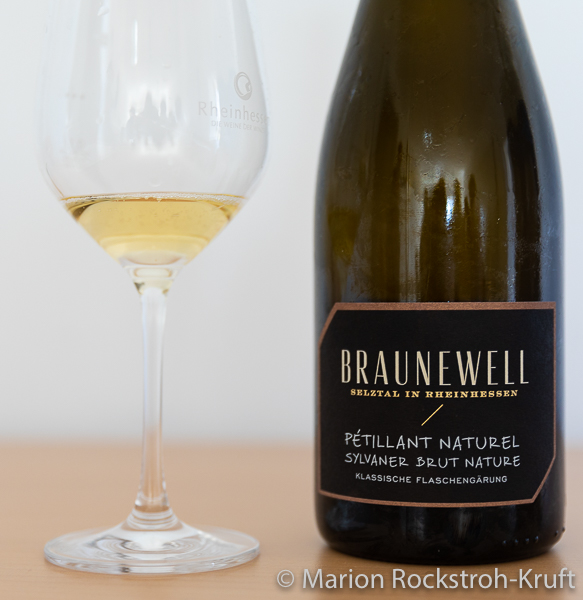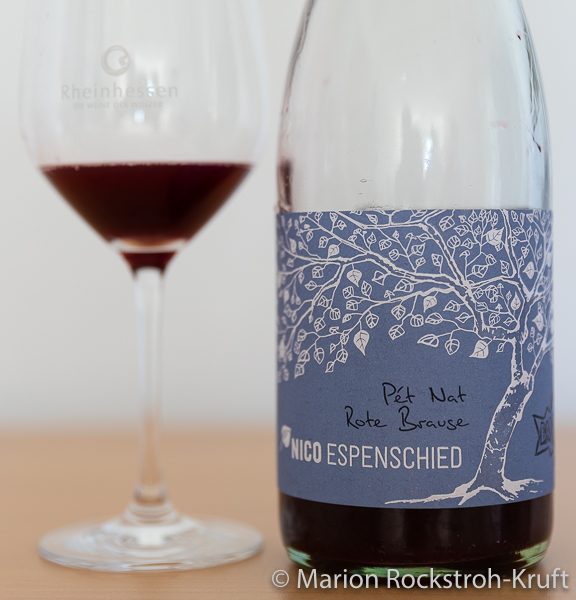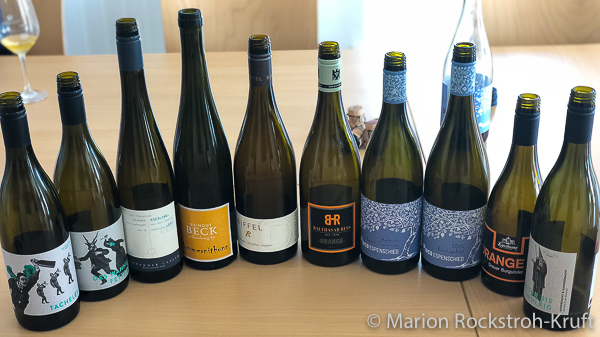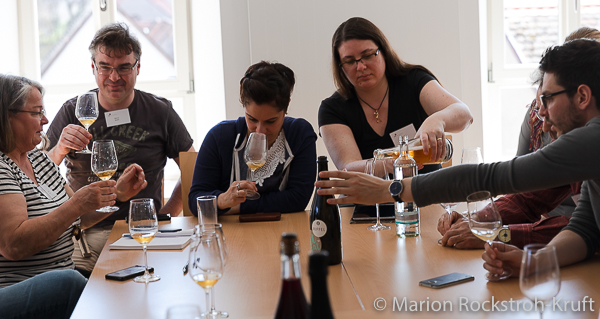A central point at Vinocamp Rheinhessen are the discussions, but at least as important are the tastings. Besides the topic Liebfrau(en)milch, I had again obtained wines from the region for the sessions Pet Nat (Péttillant Naturel), natural wine and orange wine.
Here again – many thanks to the wineries for supporting us so generously!
Some participants were already “old hands” from the last years at the Vinocamp Rheinhessen – we always had an orange wine session so far. If you want to read up on how last year was – here is the link to the blog post “Naturwein Session Vinocamp Rheinhessen 2017”.
What – not only – I found particularly positive this time was that there were winegrowers present who were able to talk about their special wines directly. This was once again more exciting than a “pure” tasting – thank you very much for taking the time! And from those who could not attend, I had received detailed information, which I was happy to pass on to the group and now to you.
As a prelude, Erik Riffel from the Riffel Winery introduced us to the topic of Péttillant Naturel – orange wine and natural wine is now well known to most people.
While in the classic sparkling wine production with bottle fermentation the wine goes through a second fermentation in the bottle, in the Pet Nat the fermenting must is already filled into the bottle and completes the fermentation on the bottle. The time of bottling, and thus the remaining sugar content, is very important here, as it influences the formation of carbon dioxide. It is also up to the winemaker to decide how high the bottle pressure is and whether to degorge or not.
There is still a difference to sparkling wine – if disgorging is used, there is no dosage with sweet reserve – a Pet Nat is always fully fermented and dry.
Another special feature of many Pet Nats is the fermentation. Often the wine ferments on the mash until it is decanted – so an Orange Sparkling Wine 🙂
I found the general comparison of natural wines with craft beer by Stefan Braunewell very apt. The taste is simply different and above all more intense.
Yes, different – but not synonymous with automatically worse 😉
Hedesheimer Hof, “Schun besser”
- Pet Nat
- second round of natural wine (first comes further down),
- and since he was already better… the name 😉
- transversed
- Grape variety: Muscatel
- 24 g/l
- 2 bar
- classic bread flavors
Weingut Riffel
Pet Nat
- present, but very well integrated tannins
- Grape variety: Pinot Blanc and Scheurebe
- unfiltered and yeast cloudy
- pear aromas and herbs, typical yeast note
- alcohol: 11 % vol.
- much tension
Tip from the winemaker: goes very well with fatty and spicy food – that’s where the tannins come in 😉
Natürlich Weinreich
“Perlen vor die Säue”
(you could translate it to: “Pearls before swine”)
- Pet Nat
- although only very few bottles in stock, we got a sample bottle – THANK YOU!
- strong tannins
- Integrated acid structure
- one participant spontaneously said, “reminds me of hearty cider”
- Copper colours with orange reflections
- flowers, honey and yellow fruit aromas, subtle yeast note
- 2016
- Grape variety: Riesling, Silvaner
- alcohol: 11,5% vol.
- residual sweetness 0,6 g/l
- Acidity 4,6 g/l
- bottle fermentation 7 months
Weingut Braunewell
Sylvaner Brut Nature
- Pet Nat
- appearance and presentation quite classic – is related to the planned sales market
- “tame” tannins
- Stone fruit and ripe apple aromas, typical yeast note
- Grape variety: Sylvaner (limestone, from first harvest)
- alcohol: 12,5 % vol.
- Acidity: 4.9 g/l
- residual sugar: 0,0 g
Nico Espenschied
“Rote Brause”
(you could translate it to: “red Soda”)
- Pet Nat in red – none of us had drunk that before
- much pressure on the tongue
- aromatic
- an explosion that will be remembered 🙂
- Grape variety: Syrah & Cabernet Franc
- red fruit aromas, paprika and green pepper
- crisp tannins
Weingut Schmitt
Pet Nat
- “Wine is fermented grape juice, a natural product. We are convinced that it must be treated naturally.”
- harvested by hand and mechanically destemmed
- were on their shells for a week
- filled with 20g/l residual sugar
- once degorged and not sulphurized, naturally cloudy
- Grape variety: Huxelrebe, Ortega and Bacchus
- dried fruit aroma and yeast note, present tannins
Sylvaner
- Natural wine
- destemmed grapes lay for six weeks on the skins in open vats
- aged in large wood
- bottled after 9 months, without filtration and sulphur
- Aroma of herbs, hay and very ripe yellow fruits
- Acidity and residual sweetness balanced
- present tannins and “typical” natural wine notes in the nose
Hedesheimer Hof
“Mussmernithunn”
(you could translate it to: “Don’t have to have it”)
- Orange Wine
- Grape variety: yellow Orléans from experimental cultivation, the oldest grape variety in Germany
- trampled underfoot
- 2015 read
- barrique-fermented
- a firework of aromas and crisp tannins
- not for sale
Weingut Riffel
Silvaner Réserve
- Natural wine
- The term “Réserve” is not protected in Germany, therefore it is used here deliberately and a higher quality is defined
- fully ripe grapes destemmed by hand and fermented over 14 days
- after pressing into new barrique and matured on full yeast for one year with regular battonage
- only roughly filtered during filling
- 2014
- Grape variety: Silvaner
- Soil: loess-loam, quartzite – gives noticeable minerality
- alcohol: 12,5 % vol.
- residual sugar: 0.1 g/l
- Acidity: 4,5 g/l
Weingut Gysler
Riesling Natur
- Natural wine
- anthroposophical and energetic accompaniment of the vineyards
- Motto: “Wines of purest soul”
- Finishing without any additives, even without the addition of sulphur
- Large plant location “Vum Helle” in Weinheim
- Meticulously selected, harvested by hand, destemmed
- fermented on the grape skin for 11 months in large wooden barrels
- drawn naturally cloudy onto the bottle without the use of pump and filter
- 2016
- Grape variety: Riesling
- Alcohol: 12.5% vol.
Weingut Balthasar Ress
Pinot Blanc Orange Wine
- brought by a participant from Wiesbaden, we also allow a Rheingau wine in the round 😉
- 2016
- Grape variety: Pinot Blanc
- unfiltered and filled with only little sulfur, it had a clear sulfur note in our sample
- amber with reddish reflections
- ripe apple aromas – impressions of leather, tobacco and roast aromas
Nico Espenschied
“Bauchgefühl” Pinot Blanc & Chardonnay
“Hautnah” Red Traminer
(you could translate it to: “gut feeling” & “Up close” )
- Laura and Nico trust their gut feeling – nature gets the last word
- Grapes separated from the juice late and pressed very gently
- spontaneously fermented on the mash and Sur Lie in the wood
- no fining agents and only slightly sulphurised
- both wines with balanced acidity, residual sweetness and tannin ratio, in the “typical” orange range – even more angular, but very good 🙂
- Apricot and apple aroma / with the red Traminer discreet floral notes
- well-balanced orange wines with present minerality and ripe tannins
Natürlich Weinreich
- especially important is a good selection and an extremely healthy harvest
- destemmed with machine and fermented on the mash in 800l boxes covered
- 1-2 times daily lightly tamped for better contact of the grapes
- stored cool for 4-6 weeks
- fermented spontaneously
- Juice drawn off into used barrels by gravity (with a lot of effort it is possible to pump the wine only once)
- 5-6 months on fine yeast, battonage from time to time
- no sulphur, no additives and no filtration
- the winegrowers themselves are surprised “how similar the vintages are naturally over the years,” without the need to produce a similarity with the help of aids
- all wines impress by a good balance of acidity and residual sugar, with a minerality present in the tannin-influenced orange wines
“Tacheles”
- 2017
- Grape variety: Bacchus, Kerner, Silvaner
- from my point of view a “beginner’s orange” due to the fruit aromas that bind the tannins well
- Alcohol 10,5% vol
- residual sweetness 0,4 g/l
- Acidity 5,3 g/l
- Mash fermentation 1 month
- Expansion half butt (600 Liter Barrel) 5 months
“Des Wahnsinns Fette Beute”
(you could translate it to: “Madness’s Big Booty”)
- 2017
- Grape variety: Chardonnay
- The grape variety can bring a certain “lushness
- This is a great game and the orange wine lives up to its name
- Alcohol 12.0% vol
- residual sweetness 0,3 g/l
- Acidity 5,1 g/l
- Must fermentation 2 months
- Expansion half butt (600 Liter Barrel) 5 months
“Heiter bis Wolkig”
(you could translate it to: “”Bright to cloudy””)
- 2016
- Grape variety: Dornfelder, Kerner
- in the tradition of the Rotling, this natural wine is developed – from my point of view it receives the advantages from both worlds
- present tannins and apple aromas
- alcohol 11,5% vol
- residual sweetness 0,2 g/l
- Acidity 5,2 g/l
- Mash fermentation 1 month
- Expansion half butt (600 Liter Barrel) 5 months
Weingut Eppelmann
“Orange”
- 2015
- Grape variety: Pinot gris
- undergo mash fermentation in stainless steel
- Barrique
- 5 months on full yeast
- we also tasted last year … there he had a lot more edges and corners and seemed not quite balanced
- this year the absolute surprise for all of us – round and harmonious
- Curry and candied fruit
- Tannins much more pleasantly integrated than last year – great!
Conclusion to the sessions on Pétillant Naturel, natural wine and orange wine:
- In the beginning, these types of wines were often conspicuous for their faults, but there are now many winemakers who have specialised in this and who bring some great wines to the bottle.
- As we have heard, especially with this type of winemaking, the experience in handling the vinification plays a very important role. This can only mean that the wine continues to go uphill 😉
- I liked the comparison with craft beer very much – these wines simply taste different and because of the way they are made they are more intense and unusual. If you are willing to get involved, there is a lot to discover.
- Will orange wine or natural wine ever reach the mainstream or will it have to? From my perspective – no. It remains a niche – but a wonderful and exciting one – and let’s just see what will happen here in the coming years.
- … and of course I will try again in 2020 at the fourth Vinocamp Rheinhessen to organize a session on Pet Nat, natural wine and orange wine
… if that is what the participants wish 😉

